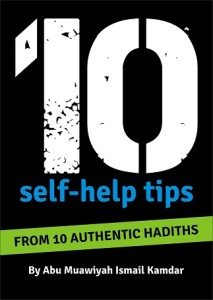Ramadan Time Management Tips – Part 2
This is Part 2 of my series on Time Management Tips for Ramadan, click the above link if you haven’t read Part 1 yet.
4. Allocate time to each goal
Now that your goals for Ramadan are clearly defined and you know how much time you have daily for Ibaadah, the next step is to combine this by allocating specific times daily for chasing each goal. Eg: If you have the goal of reading 30 pages of Tafsir daily and that will take you an hour, and you know that you have an hour a day free every evening before Tarawih, then allocate that time to be your Tafsir time.
Likewise, allocate specific times of each day things for each important act of worship. This means that you will set a specific time of the day for reciting Qur’an (perhaps before or after Fajr), making dua (before Iftar), having a family Halaqa (perhaps after Asr or after Tarawih) and any other goals you are working towards. Be specific as possible and stick to your times.
There may be days when you are unable to stick to the times completely due to elements beyond your control, but at least by having such a schedule, even on such days, you will make time to get these things done. If you are having an unusually busy day, instead of abandoning these goals completely, try halving them. So instead of not reading Tafsir at all for a day, try reading for half an hour or at least twenty minutes. In this way, you stay on track, even on your busiest days.
5. Utilize the early hours of the morning
Depending on whether Ramadan falls in Summer and Winter in your country, this would refer to the time before or after Suhoor. In Summer countries, Suhoor is quite early and many people can’t wake up too early before it. In that case, I recommend utilizing an hour after Suhoor for Ibaadah.
In Winter countries, Suhoor is quite late so waking up an hour before it is easier. In such countries, I recommend waking up an hour earlier (or at least half an hour early) and dedicating that time to Qiyam Al-Layl (Tahajjud), dua and reciting Qur’an.
The reason I emphasize the early mornings is because it is a time known for having Barakah. It is a time when we are not preoccupied with work and family obligations. Making it the best time of the day to dedicate to intense ibaadah, a private time alone with Allah.
6. Schedule in a family Halaqa
If this is not already one of your established habits, I recommend starting it this year. Ramadan is the perfect time for the family to bond and grow in Imaan together. The devils are locked up and everybody is more spiritual. This spirituality needs to be nurtured so that we can benefit from it after Ramadan. One way to do this is to establish a family Halaqa (study circle).
This can be done by getting to together before Iftar or after Taraweh, reading a chapter of an Islamic book (or listening to a lecture) then discussing its contents with each other. Involve every member of the family in the discussion. This will train the younger minds of the family to think and reflect, helping them grow into practicing thinking Muslims. The habit of having a family Halaqa is one that should continue after Ramadan.
7. Dedicate time daily for Qur’an
Ramadan is the month of the Qur’an and so it is obvious that time must be dedicated daily to the Qur’an. In some communities, the practice exists of reciting the Qur’an very quickly each Ramadan to get it over with. Instead of doing this, focus on reciting properly, studying the Tafsir and reflecting on its meanings. This will have a longer lasting effect on one’s Imaan and Taqwa.
In Part 3 of this series, we will discuss some more time management tips for staying on schedule and getting things done this Ramadan.
Shaykh Ismail Kamdar is the author of Getting The Barakah: An Islamic Guide to Time Management, available exclusively through this website. Learn more Time Management Tips by purchasing this ebook.






